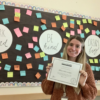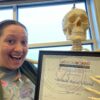Career Leap Inspired by Love of Literature

Online teacher certification opportunity made a teacher’s career leap possible. But it was a love of literature that inspired this teacher’s decision to enter the classroom.
American Board’s Teacher Graduate Spotlight
American Board graduate Pearl S. writes, “after twelve years staying at home with my own kids, I decided to make the career move as an adult to become a teacher”. Why, you might ask, was she willing to make this career leap? As Pearl explains, it can all be traced back to A Wrinkle in Time.
Pearl explains, “Madeleine L’Engle, author of A Wrinkle in Time, once wrote about her favorite teacher, Miss Margaret Clapp, as one of the biggest influences on her young life. It was Miss Clapp’s first job teaching. She didn’t know it, but a young Madeleine skipped home one afternoon and called to her mother, “Mother, Mother, you ought to scold me for the sin of gluttony!” “Whatever for” asked her mom.“Miss Clapp liked my story so much that she read it out loud to the whole class, and I was so happy I just gloated and gloated.”(Madeleine L’Engle, A Circle of Quiet) What a beacon of light for little L’Engle—the smallest flicker of excitement fanned into flame by one Miss Clapp!
Making the Career Leap
In Pearl’s words…
I didn’t know the first way to go about it, except by first substitute teaching at my children’s public school. This was easy enough, as I already had a college degree and a clean background check.
Several days consisted of looking over substitute plans that were usually interspersed worksheets with “brain breaks” and other internet-reliant videos. But I could see it in the students’ eyes: what they really desired was someone who could show them a passion for learning.
They craved a person who could transcend alternate realities and viral sensationalism to soak to the root of what children were truly thirsty for: good dirt in which to grow. I had the creativity and the energy as well as the desire to improve academics for kids. I had every intangible quality to apply—I just needed to find the alternative route to getting there.
Enter American Board Certification for Teaching Excellence. I had already earned money working as a substitute teacher. I then invested it in the Elementary Education portion of the ABCTE program. It was a small financial commitment when I compared it to potentially returning for a master’s degree or semesters of education classes at a local college.

My American Board Study Habits
Subject Area Studying
I studied intensively at home when the kids were at school. I also studied in the evenings, after they went to bed. After American Board received my transcripts, they emailed me with directions on how to begin the program. The directions were two-fold: study for the subject-area exam and study for the Professional Teaching Knowledge (PTK) exam. American Board provides all required materials with additional resources listed, if needed. I chose to begin with the subject area, mine being elementary education.
Fortunately, the studying was easy enough, thanks to my nightly reading habits. My own kids are quiz bowl wizards who helped well. A good portion of the material was stuff I was already familiar with. Particularly, world history and algebra because those years of doing homework with kids pays off! I took three or four multiple-choice quizzes at night to see where I was and what I needed to study. At the end of each quiz there was a score. Each question and answer was accompanied by an explanation as to why the answer was right or wrong. I quickly narrowed down my weak spots and began to study those areas with greater concentration. Sometimes I queued up YouTube videos to go over certain amendments to the Constitution and Civil War battles. I realized I’m very much an audio learner—access the information however works best for you!
After setting aside a couple afternoons to take the practice exams (and to get my eyes used to staring at the computer for a longer period of time), I felt fully prepared. Scheduling the test was a simple matter, and I passed the exam after two weeks of studying.
American Board’s PTK Exam
Next up was the PTK portion, and I immediately began watching all the videos provided on the website. The speakers emphasized the “best practices” part of professional teaching knowledge. Before studying the standards, I honed in on the wording of the multiple choice answers and determine what answers should be eliminated based on unnecessary lexicon. This felt unfamiliar, and I was initially worried about my inability to make a good judgment call.
Understanding Best Practices
I decided I would watch all the videos offered throughout the PTK portion of study materials. After becoming more familiar with the ideas of classroom management and instructional delivery and design, I was able to read through the texts with less difficulty. There are tried and true methods that don’t just make sense, but make the most sense in a given situation. For example, silently moving toward a student who is uncharacteristically misbehaving is always better than abruptly halting the lesson to address it. This might feel tricky to a potential second-career teacher, but it’s worth studying so that in the long run, you’ll have the tool in your toolbelt. After I felt I understood the reasoning behind the actions, I was better able to read through the standards themselves and hold them in my mind as “best practices”. This made it much easier to take the practice exams and immediately eliminate answers that offered sub-par solutions (i.e. not “best practices”).
Navigating the Essay
The PTK exam also boasts an essay portion. It is a timed, open-ended response to a hypothetical problem. I think the open-endedness of it tends to trip up test-takers because they worry about content. In fact, it has less to do with the content and more to do with your ability to write a coherent memo in essay form. The essay is quite simple if you remember to complete the task and organize it appropriately. Once again, this is reiterated in the videos. On the essay portion of my exam, I waxed on about school culture and climate because they were high value words at one of my kids’ former schools. I even dropped a few metaphors (because I’m a writer and can’t help it, I guess). I still scored a very medium 4 out of 6.
The Finish Line
I took the PTK exam and passed three weeks after passing the subject area exam. In all, it took five weeks for me to study for and pass both exams. Within two more weeks, I received the certification in the mail. By far, this has been the most economical and simple path for someone like me to make a decisive career change. I can’t imagine trying to take night classes or do Zoom meetings with four small kids. With ABCTE, I was completely on my own timeline, working it into my schedule. This is incredibly advantageous to a person like me who can buckle down and do the work with a deadline looming. For me, online teacher certification was definitely the best option.
Pearl’s Tips for American Board Success
- Begin by identifying your weak points in the subject area. This can be done most efficiently by taking the practice quizzes and reviewing the results.
- Set a deadline for the exam. You might need several months if you are unfamiliar with the content area. You might only need a few weeks if you’re confident in a particular subject.
- Set aside time to study in chunks of at least 2-3 hours—this is necessary to build up endurance for the computer exam.
- Utilize the study resources offered. Take the time to listen to and watch all extra videos.
- Schedule exam for the morning. No need to build up unnecessary stress by putting it off till the afternoon.
Conclusion
Madeleine L’Engle writes about Miss Clapp being a point of reference for her in her young life, a hero, who, by simply being a teacher who cared for kids, helped L’Engle to see the potential in herself. “All teachers must face the fact that they are potential points of reference. The greatest challenge a teacher has to accept is the courage to be; if we are, we make mistakes; we say too much where we should have said nothing; we do not speak where a word might have made all the difference. If we are, we will make terrible errors. But we still have to have the courage to struggle on, trusting in our own points of reference to show us the way.”
We teachers aren’t infallible, but we are essential. Is teaching in your future? Will you be a child’s point of reference, their springboard, their hero?
Learn how you can become a teacher, quickly and affordably, by visiting www.americanboard.org.





